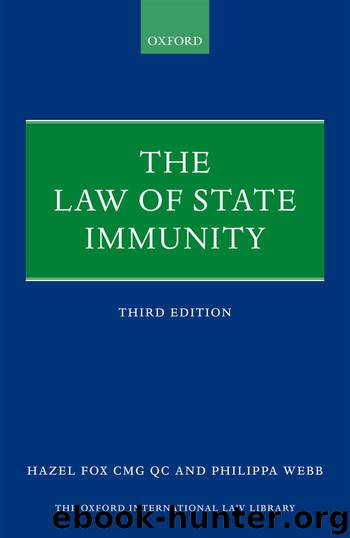The Law of State Immunity by Webb Philippa Hazel Fox & Philippa Webb

Author:Webb, Philippa, Hazel Fox, & Philippa Webb
Language: eng
Format: epub
Publisher: OUP Oxford
Published: 2013-04-17T04:00:00+00:00
The 1999 ILC Report
With all this complexity there was little that the ILC could do when the issue was referred back to it in 1999 other than to question what the fuss was about. And this is precisely what it did. It proposed the deletion of all reference to either the nature or the purpose test. After a survey of the history of the Draft and recent case-law and identifying some seven possible alternatives the 1999 Report stated:
As a result of this examination and in view of the differences of the facts of each case as well as the different legal traditions, the members of the group felt that alternative (f) [reference to Article 2 only to ‘commercial contracts or transactions’ without further explication] above was the most acceptable. It was felt that the distinction between the so-called nature and purpose tests might be less significant in practice than the long debate about it might imply (paragraph 60).
This was still not the end of the story. The 2002 Draft of the Articles presented by the UN Working Group set up by the Sixth Committee under its second chairman Mr Hafner contained two versions. Version B proposed the deletion of the provision in its entirety as recommended by the ILC Working Party, but it was opposed by the delegates as favouring the exclusive application of the nature test and providing no guidance to governments, courts, or practitioners. Version A accordingly went forward and appears as Article 2(2) in the final text.
The ILC Commentary to Article 2(2), paragraph 26 explains:
This two-pronged approach [to nature and purpose] … is designed to provide an adequate safeguard and protection for developing countries, especially in their endeavours to promote national economic development. Defendant States should be given an opportunity to prove that, in their practice, a given contract or transaction should be treated as non-commercial because its purpose is clearly public and supported by raison d’état, such as the procurement of food supplies to feed a population, relieve a famine situation or revitalize a vulnerable area, or supply medicaments to combat a spreading epidemic, provided that it is the practice of that State to conclude such contracts or transactions for such public ends.
The purpose of the transaction remains an important element in the final version of Article 2(2) and takes account of concerns of developing States and adherents to the absolute doctrine. But it is considerably weakened in that, instead of the subjective views of the contracting defendant State, reference is to be made to an objective expression of purpose either as agreed in the contract or transaction or to the practice of the forum State.
As a piece of drafting it is highly unsatisfactory on its face since it requires a national court to engage in a four-stage exercise in determining whether it has jurisdiction in a commercial transaction under Article 2(1)(c)(iii). First, in the absence of evidence of purpose, it may refer to the nature of the transaction, but, secondly, where there is evidence of
Download
This site does not store any files on its server. We only index and link to content provided by other sites. Please contact the content providers to delete copyright contents if any and email us, we'll remove relevant links or contents immediately.
The Pirates of Somalia by Jay Bahadur(1641)
Political Theology by Carl Schmitt(1586)
The Holocaust: A New History by Laurence Rees(1526)
The Social Animal by David Brooks(1459)
A Practical Guide to International Arbitration in London by Hilary Heilbron(1441)
Restitution by Restitution(1428)
Pirates of Somalia by Jay Bahadur(1387)
Coercing Virtue by Robert H. Bork(1361)
The Nuremberg Interviews by Leon Goldensohn(1307)
Basic International Corporate Taxation by Sebastiano Garufi(1220)
A History Of Thailand by Baker Chris(1197)
International Trade and Business: Law, Policy and Ethics by Gabriël Moens & Peter Gillies(1152)
The Global Commons by Susan J. Buck(1141)
Blood Profits by Vanessa Neumann(1121)
Asian Waters by Humphrey Hawksley(1117)
The Sovereignty of Human Rights by Macklem Patrick(1115)
Spring Fever: The Illusion of Islamic Democracy by McCarthy Andrew C(1110)
The Nuremberg Trials: The Nazis and their Crimes Against Humanity by Roland Paul(1055)
Crimes Against Humanity: Historical Evolution and Contemporary Application by M. Cherif Bassiouni(1030)
